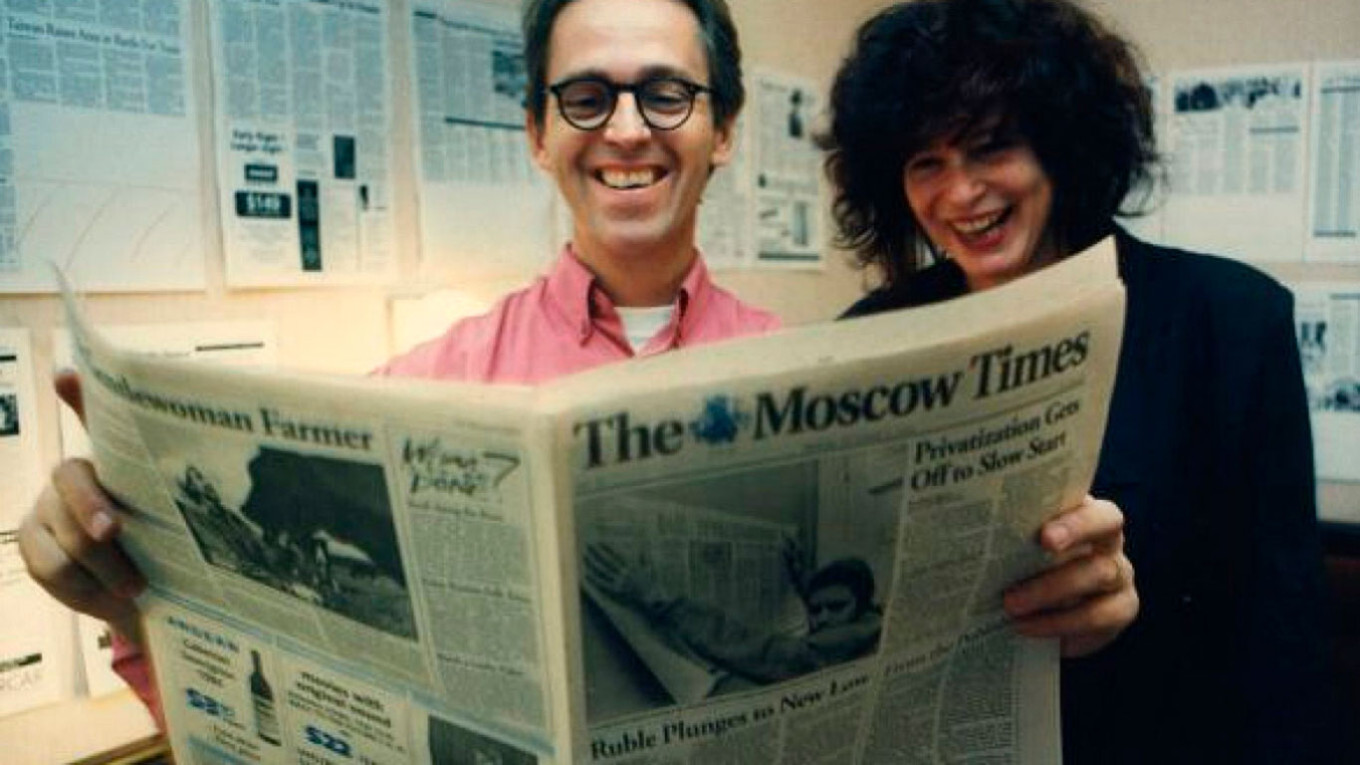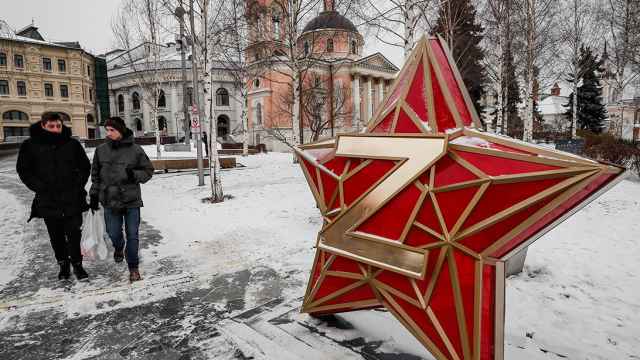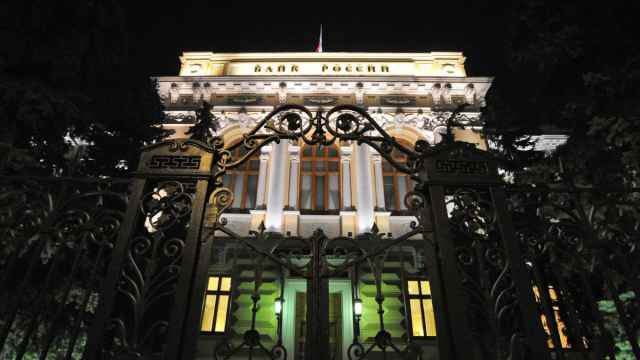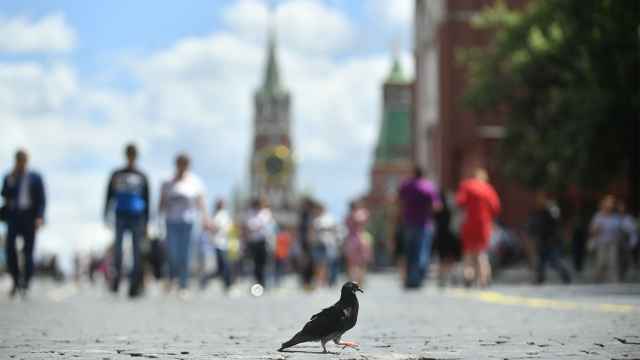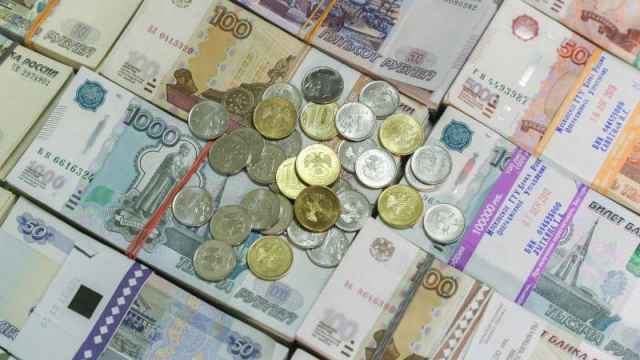Certain times demand that you put pencil to paper and start taking notes. Otherwise, no one would know — and few might believe — what was really happening. Periods of dramatic political disruption. Surges in social transformation. Breakdowns — or breakthroughs — in financial markets and economic life.
When events in 1990s Russia stretched the wildest imagination of locals and expats alike, The Moscow Times got it all into print, all in time for breakfast the next morning.
The task was as phenomenal as Russia is vast. The collapse of the Soviet Union and the shock wave of gravity-defying political, economic and social upheaval transformed everyone and everything in its wake, from within the deepest Kremlin cliques to the windswept tip of Sakhalin Island along Russia’s Pacific rim.
The 1990s were grim, yet full of contradictions. In the early days, state salaries went unpaid and starvation loomed in communities across Russia, while the Soviet economic engine staggered in a daze toward almost complete collapse. Russia’s first decade also saw the formation of indescribable wealth and its ludicrous, extravagant trappings. The privatization of thousands of former state enterprises created a class of Russian millionaires and even billionaires — the novye Russkiye, a spin on the nouveau riche — in what felt like an instant. Aeroflot started flying nonstop to Nice in 1995, connecting the newly wealthy with their European counterparts.
Western goods and services, followed by their CEOs, their marketing departments and the consultants who guided them, stormed into Moscow and beyond. “To Snickers” — snikersni — became a verb telling Russian consumers how to take a break and enjoy a candy bar. Westerners who might remember trading Levi’s jeans for cash on the Soviet black market could now buy them in Russian shopping malls. Some people who moved to Russia as au pairs became tax consultants.
Let the scale of that transformation sink in for a moment. All that was spelled out across the pages of The Moscow Times.
As the world asks itself how Russia, how the West, and how the global geopolitical order arrived at today’s state of upheaval, tension and tectonic change, The Moscow Times archive holds many of the clues.
Russianists inside and outside the country are once again combing through the 1990s for the early signs and symbols of Russia’s current state of affairs. Without The Moscow Times, that task would be immeasurably more difficult. As we seek to understand where Russia is headed and the role it will play in the future regional and global order, only one platform is documenting contemporary Russia as it evolves.
Amid the post-Soviet chaos, there was an energy of liberation and an air of hope on so many fronts. Culture and the arts — sometimes on a shoestring, sometimes on the grand stage of the Bolshoi — flourished.
Politics became a street-level bazaar with all the attendant sights, sounds and smells: remember the Beer Party?
Socially, whatever was not expressly forbidden was allowed — imagine what that means as you will. The Moscow Times immortalized it all, including the unhinged bacchanalia that was clubbing at The Hungry Duck.
On the news pages, the business pages and the sports pages, not to mention The Wistful Gourmet cooking column that conjured banquets in the face of periodic food scarcity, The Moscow Times was a chronicle and a lifeline for English-language readers. Not every reader was an expat. But every one of them — Michigan transplants and Moscow natives alike — came to The Moscow Times for a 360-degree view of their world, in the thoroughly reported, fact-based style of an objective, Western publication.
Few newspapers provided the vivid granularity and we-were-there grit of the first Chechen War. Few reporters saw as deeply and as quickly into the transformative and corrupt nature of the loans-for-shares scandal, a series of public-private transactions that were the original sin in the debasing of Russia’s attempt at a market economy.
When that economy imploded in August 1998, laying low the country’s first economic boom, The Moscow Times nailed the capital’s mood on its pages as the ruble tanked, expats cried into their beer and armies of accountants left the country for good.
Good reporting is never easy. But good reporting in 1990s Russia required resourcefulness and a devotion to the craft. Many of the modern tools available to journalists today did not exist in the 1990s. On the other hand, there was — not always, but often enough — a public candor in Moscow circles that had still not fully learned to hate the media. Russia had yet to enter the world of spin doctors and slick PR agents.
The reference to pencil and paper is not meant to romanticize the reporter’s trade. Back then, reporters grabbed small spiral notepads and pens before heading out to report a story. Reporters who had money to burn (a rare breed) may have had a Dictaphone (Google it) with a microcassette inside. Anyone reporting out in the city came back to the newsroom in the late afternoon, sat down at IKEA-style tables and hammered out stories on Macintosh desktops that looked like vertical shoeboxes with small video screens.
In those primitive days, some Russian government and business executives sometimes mistook The Moscow Times for The New York Times. Perhaps they thought The Moscow Times was the Moscow bureau of the legendary American newspaper. There were, of course, moments when The Moscow Times scooped The New York Times, not to mention The Washington Post and The Wall Street Journal.
Had it not been for The Moscow Times, for example, no one would have known that in 1994 the children of an Aeroflot pilot on a whim took the controls of an Airbus A-310 bound from Moscow to Hong Kong, accidentally dislodged the aircraft’s autopilot and triggered a series of mid-flight events that led to of one of modern Russia’s worst aviation disasters.
The entire world of newspapering followed The Moscow Times’ lead on that story. Years later, many alumni of the 1990s newsroom would take up roles as correspondents with the Times, the Post and the Journal, picking up Pulitzer Prizes and other plaudits along the way.
In the mid-1990s, The Moscow Times’ offices were at Ulitsa Pravdy, 4. The address itself requires some unpacking. Ulitsa Pravdy translates as “Truth Street,” and was home to the Soviet Communist Party newspaper of the same name: Pravda, or The Truth. With its Soviet government twin, Izvestia (The News), the two papers were the powerhouses of Soviet journalism and had millions of daily readers.
One of the more famous Soviet jokes was “There’s no truth in the news and there’s no news in the truth.” That all came to a halt in building number four, Truth Street. The Moscow Times was rigorously reported and scrupulously edited. It spoke truth to power, and never flinched, even when the Russian Foreign Ministry screamed down the phone at the editors-in-chief, threatening their expat reporters with permanent exile.
The Moscow Times’ newsroom was a melting pot of reporters from all over the world and from across the capital. In addition to a love for, or at least a curiosity about, Moscow, a sole bond united us. We worked for a Dutch-owned newspaper in Russia owned by Derk Sauer. He was not a constant presence in the newsroom; that would be the editor’s turf. But we saw him frequently anyway, and felt him everywhere, with a sense of pride and gratitude. Derk gave us, and the young Russia, a platform — and the pencils and the notepads — to tell stories you could only believe once you read them in print.
A Message from The Moscow Times:
Dear readers,
We are facing unprecedented challenges. Russia's Prosecutor General's Office has designated The Moscow Times as an "undesirable" organization, criminalizing our work and putting our staff at risk of prosecution. This follows our earlier unjust labeling as a "foreign agent."
These actions are direct attempts to silence independent journalism in Russia. The authorities claim our work "discredits the decisions of the Russian leadership." We see things differently: we strive to provide accurate, unbiased reporting on Russia.
We, the journalists of The Moscow Times, refuse to be silenced. But to continue our work, we need your help.
Your support, no matter how small, makes a world of difference. If you can, please support us monthly starting from just $2. It's quick to set up, and every contribution makes a significant impact.
By supporting The Moscow Times, you're defending open, independent journalism in the face of repression. Thank you for standing with us.
Remind me later.



